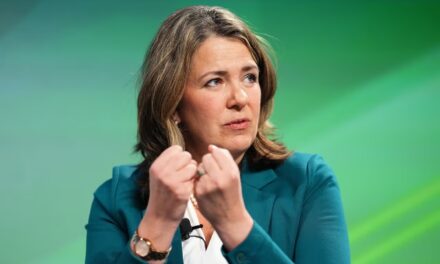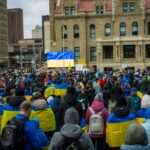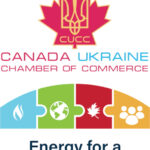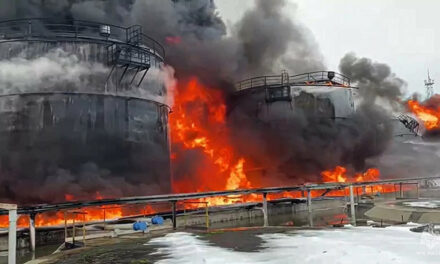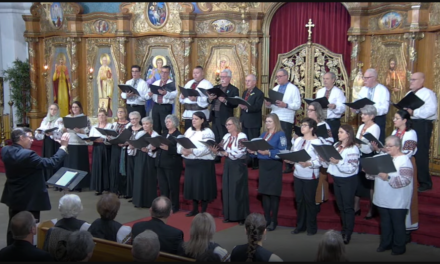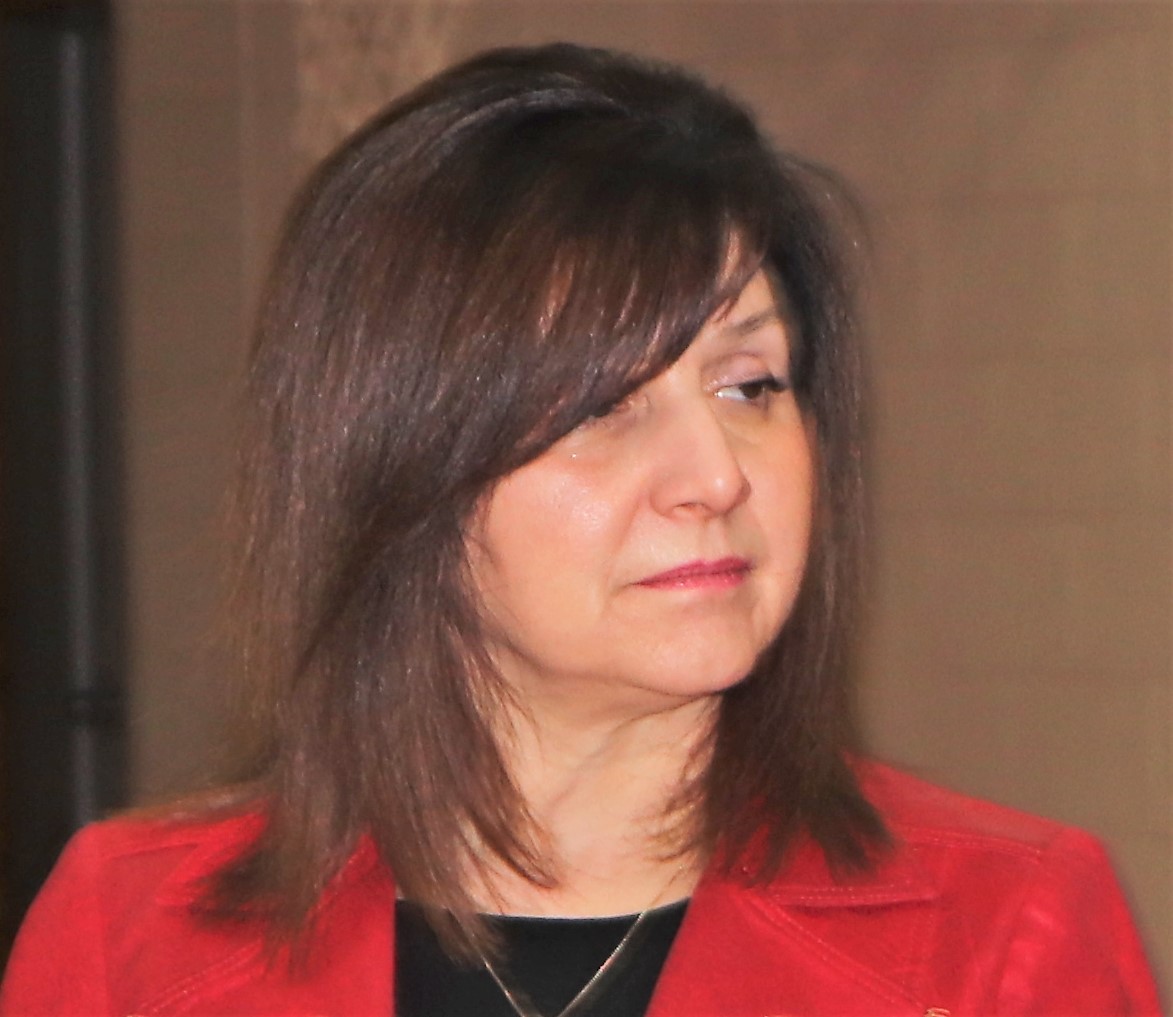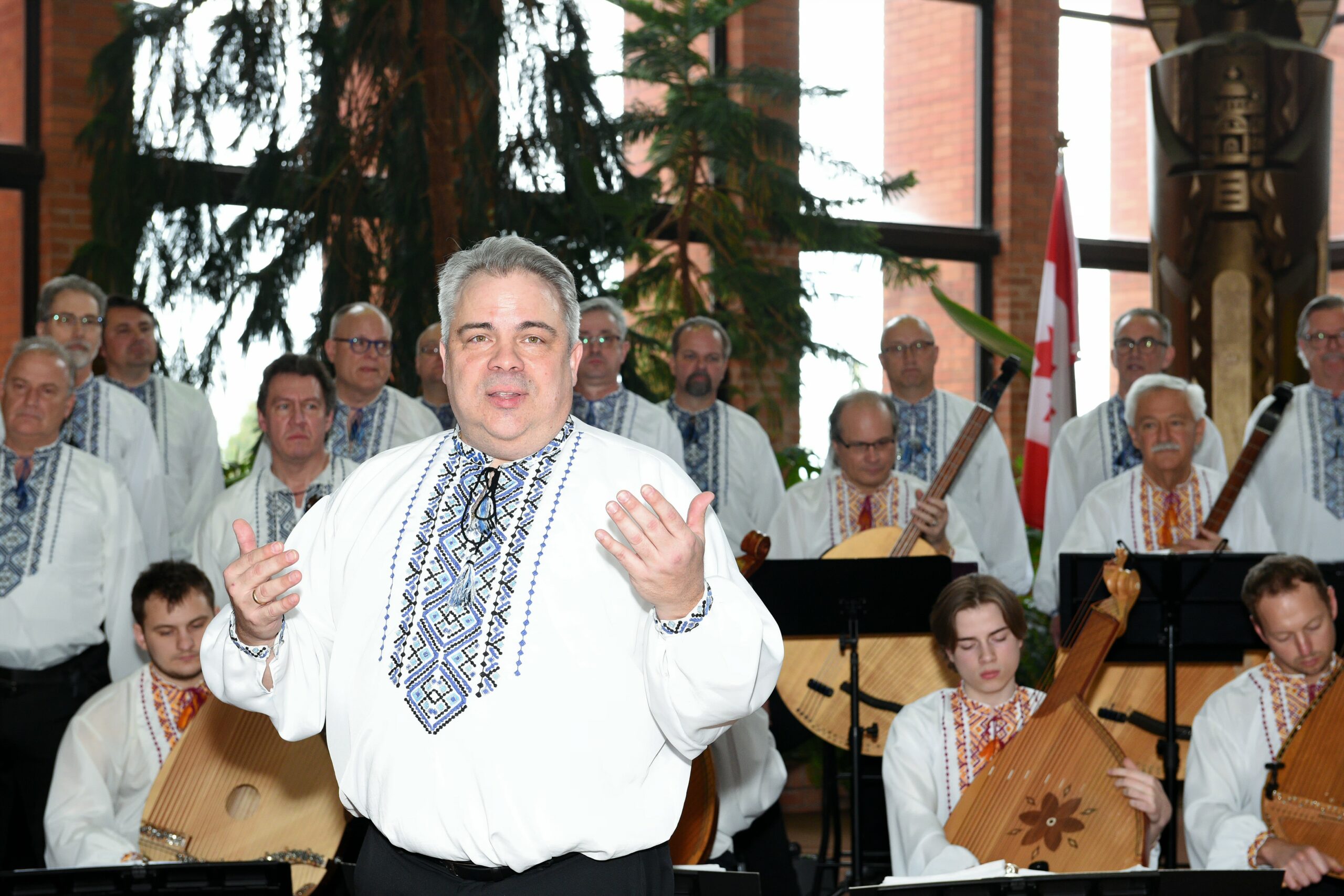Kateryna Bandura for New Pathway – Ukrainian News.
The Kule Folklore Centre and the Ukrainian Resource and Development Centre (URDC) held their third event in a series that explores the relationships between the Ukrainian Canadian community and Canada’s Indigenous populations.
“The relationship between the Indigenous people and Ukrainian people is a very real relationship that happened since the first Ukrainian showed up to these lands and continues to the present day,” said Leon Hunter during a round table discussion titled “nîkânihk: майбутнє: Our Futures on These Lands”, November 17.
The panel explored the rich ancestral relationships between the Ukrainian Canadian community and the diverse Indigenous communities in terms of land and land practices.
“I learned Ukrainian from a very young age, and I’m really excited to see the intentional revitalization of those indigenous languages, that’s just going to strengthen those cultural ties,” Hunter, manager at Métis Crossing, Alberta’s cultural interpretive centre for Alberta Métis, said. “There’s one thing about bringing back these languages and speaking with them, you start to understand the way that these cultures interacted with the land.”
“The relationship to the land can be seen through the words that are used in these languages,” he said.
According to Hunter, the cultural awareness that celebrating and learning your language brings is very deep and profound.
“One of the things that I regret now, especially with the passing of my baba, is that I’m really missing that extra generational connection, that ability to really connect with my great grandmother, because she only spoke Ukrainian and I only spoke English,” said Leah Hrycun, second year PhD student in the Faculty of Native studies at University of Alberta.
Hrycun recalls that speaking English was instilled in her through generations.
“We cannot speak Ukrainian, we need our kids to do well and so they need to speak English,” she said. According to her, this shows how much she missed from her great grandmother’s teachings.
“I know that in the old country at certain time after the war, they had to share one horse between seven families. I would have loved to learn more about that,” Hrycun said. “I would have loved to learn more about the role and the relationship that she had with the land specifically, I would have loved to learn why she had to plant the peas on crosses, because that’s what the land demanded.”
“There’s all these different relationships to land that she had, that we, as non-Ukrainian speakers, really missed out on,” Hrycun said. “The relationship of my ancestors to the land was interrupted when they came here because everything was so different. And while they tried to bring in a new relationships to the land, oftentimes with further generations, that relationship was lost.”
The loss of relationship with land was experienced in the Ukrainian Canadian community as much as in the Indigenous community. The panel discussed the idea of Land Back – an Indigenous-led movement described as “people returning back and finding their place in those systems of life.”
To Barry Bilinsky, Indigenous theatre artist and co-director of Shumka’s “Ancestors and Elders”, Land Back is about reverse engineering and understanding how we got in this situation in the first place.
“Ukrainians and Indigenous folks both experienced the intentional breakup of community from the Canadian government and the intentional attack on our languages,” Bilinsky said. “All of those were to separate us from our ability to communicate with our children, our connection to the land and our connection to the power source that Canadian government is looking at acquiring.”
“For me, partially, Land Back is rectifying that journey and attributing funds to residential school survivors, to the families of residential school survivors, to taking a look at treaties and where those have been broken apart,” Bilinsky said.
However, as Bilinsky believes, people are afraid to take responsibility.
“I once asked Dr. Leroy about why is there so much resistance to people just wrapping their heads around the concept that the territory has a spirit and that we have a relationship to the land, and his wife said, ‘because people are afraid of being responsible’.”
“If I’m not just responsible for myself but I’m responsible for you and your family and for the water and for the trees and for the ecosystem as well, all of a sudden the expectation on me goes a lot higher as to what I have to do,” he said.
“Is it the responsibility of the Ukrainian community to execute reconciliation in Canada?” Bilinsky said. “As individuals, we get scared of that. As communities we get scared of that.”
He said that people start to realize that all these problems are interconnected and a lot more complicated.
“I think if you consider responsibility within a hierarchy, then you have a certain number of people who are responsible, and everybody else just gets to not worry about it,” Chelsea Vowel, the roundtable’s moderator, said. “But if you think of responsibility within reciprocity, then not only is it just a burden that you bear, it’s that you share the responsibility with others.”
“That kind of non-hierarchical relationship is not a scary burden we should avoid, but rather a recognition of the ways that we support one another,” she said.
Land Back is one way to rectify the situation, however Leah Hrycun believes that fixing our relations with the Indigenous people is as important.
“One of the big questions that I get from Ukrainian Canadian settlers is ‘do you think that there are folks who share Ukrainian and Indigenous ancestry?’” Hrycun said. She said that she never gets this question from her indigenous friends because they know that many of their relations are Ukrainian.
“What happened to break down those relationships, that separated families, that separated kin from one another?” she said. “In the future that I see, I see that we don’t have to ask those questions anymore, that we know who all of our relations are regardless of how it happened.”
Hrycun said that we need to know how it happened and to understand these things so that they don’t happen again in the future, but also that we don’t blame our ancestors for what happened.
Amiskwaciy Elder Francis Whiskeyjack believes that such community-to-community relationship building has to start through mingling in a heritage space.
“Sharing the food sources and learning from another cause that relationship building,” he said. Elder Whiskeyjack comes from Alberta’s Saddle Lake First Nation whose background includes personal healing, health care promotion and cultural studies. He is a Residential School Survivor.
“It has to start with the younger people in the performances in the school, establishing those relationships there,” Elder Whiskeyjack said. “That’s what’s happening in a lot of the schools nowadays, to prevent racism from happening and young people working together.”
He was able to share his Cree language with Ukrainian farmers once he got out of the residential schools system.
“I certainly love Ukrainian people, because that’s where I learned how to drive tractor,” he said. “That’s where I learned how to garden and how to milk cows. I got along very well and learned a few Ukrainian words like holubtsi (cabbage rolls) and perogies.”
Barry Bilinsky said that there are many similarities between the Ukrainian Canadian and the Indigenous communities, but that it always graded against the reality of injustices, that there’s this system that has deliberately dispossessed indigenous people.
“We have to have more complicated conversations in order to figure out how to remedy them,” Bilinsky said.
This was the third in a series of events as part of the joint Indigenous Ukrainian Relationship Building Initiative between the Ukrainian Resource and Development Centre at MacEwan University (URDC) and the Kule Folklore Centre at the University of Alberta. The main goal of the initiative is to advance knowledge about, explore, and reflect on the Ukrainian Canadian history and the shared Indigenous-Ukrainian pasts, in order to build a better future together for the well-being of all.
The first panel, held September 15 and titled “askîy / земля / the land”, aimed to understand the Indigenous land-based practices and relationships that existed in Canada before Ukrainian settlers immigrated to the prairies. The second panel, held October 20 and titled “otâkosîhk mîna anohc: вчора і сьогодні: Yesterday and Today On These Lands”, explored what social and legislative forces impacted Indigenous peoples and Ukrainian settlers within a prairie-specific context, and how these forces influenced land-based practices and relationships.
This article is written under the Local Journalism Initiative agreement
Share on Social Media


